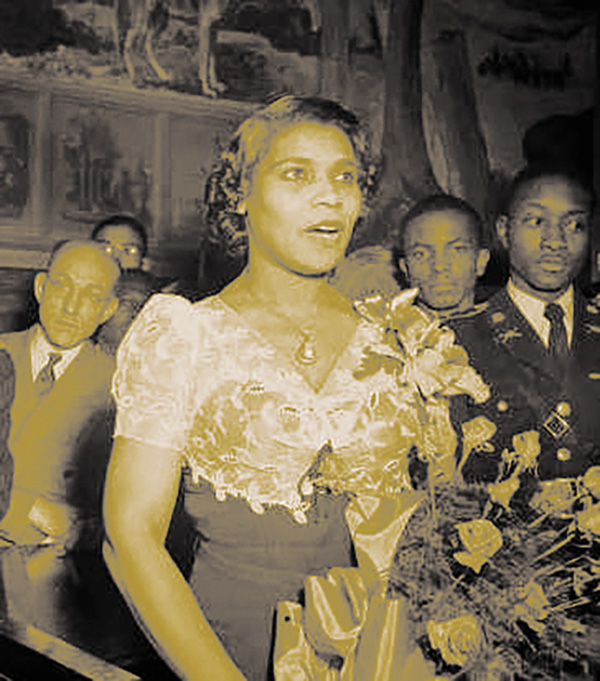Black Arts and Culture
Women’s History Month: Mother Of Marian Anderson Was Lynchburg, Va. Native
“Delve into the Virginia roots of opera sensation Marian Anderson, tracing her journey from Lynchburg to international acclaim. Discover how her legacy transcends racial prejudice, leaving an indelible mark on the world of music.”
#WomensHistoryMonth #MarianAnderson #BlackArtistry #LynchburgVA #OperaSinger #Legacy

By Rosaland Tyler
Associate Editor
New Journal and Guide
Many famous Black artists have Virginia roots, including renowned opera singer Marian Anderson, whose mother Annie Rucker Anderson grew up in Lynchburg, studied at Virginia Theological Seminary and College, and taught school before migrating to Philadelphia in 1895.
Marian Anderson not only puts a human face on the 2024 Black History Month theme, “African-Americans and the Arts,” her lineage shows many Black artists grew up in households headed by Blacks who steadily migrated from the South to the North after slavery ended in 1865.
Marian Anderson was the daughter of Lynchburg native, Annie Rucker Anderson, and her husband, John Berkley Anderson, of Philadelphia. Their daughter, Marian Anderson was born in Philadelphia on Feb. 27, 1897– about 30 years after slavery ended. One of the famous opera singer’s descendants, her mother’s father, Robert Rucker, owned a successful livery stable in downtown Lynchburg for 40 years.
Several photos show Annie Rucker Anderson standing near her trailblazing daughter, who made history when she performed on the steps of the Lincoln Memorial on Easter Sunday, 1939, before an audience of at least 75,000. The same year, the Lynchburg native’s famous daughter also performed “Ave Maria” and other songs in June in Europe for Queen Elizabeth and King George IV. Her daughter continued to make history. In 1955, Anderson became the first Black to perform with the New York Metropolitan Opera.
“When I sing … I want them to see my soul … is colorless,” Anderson once said in a trademark quote, decades after her father, John Berkley Anderson, a coal and ice dealer, bought his daughter her first piano at age 8, two years after she’d debuted as a choir member at Philadelphia’s Union Baptist Church, where she earned the nickname “Baby Contralto.”
“Oh, you have no idea the joy,” Anderson said, recalling her family’s first piano. “I remember taking one finger of his hand to make it go up the scale. His fingers were so large that I could scarcely get them on one key at a time. He may even have tried to hit two notes to make me feel that he couldn’t do it as well as.”
Marian Anderson’s father died from a head wound at their home when she was 12, about a week after a heavy machinery accident occurred on the Philadelphia train line where he was wounded while working.
Their church choir raised about $500, to pay for Anderson to train under Giuseppe Boghetti, a respected voice teacher, who was so impressed with her talent that he offered her free lessons for one year. About two years later, Boghetti’s tutelage earned her a spot at a singing contest in Lewisohn Stadium in New York organized by the New York Philharmonic Society. She beat out 300 rivals.
Anderson’s mother and two sisters often hovered behind the curtains while she performed. They also savored the applause when Anderson performed at Carnegie Hall for the first time in 1928. And they waved farewell when she embarked on a European tour, thanks to a Julius Rosenwald scholarship. Anderson’s trailblazing career also included performances for the monarchs of Sweden, Norway, Denmark, and England.
Records show racial prejudice dogged Marian Anderson’s steps throughout her historic opera career but never dimmed her talent. For example, in 1935, the Daughters of the American Revolution (DAR) refused to let her sing in Constitution Hall in Washington, D.C.
In response, Eleanor Roosevelt arranged for Anderson to give her concert on the steps of the Lincoln Memorial on Easter Sunday, April 9, 1939 before a crowd of 75,000 people of all races.
When she finally performed in Constitution Hall in 1943, about a decade after the 1935 DAR protest, Anderson said, “I felt no different than I had in other halls. There was no sense of triumph. I felt that it was a beautiful concert hall, and I was happy to sing in it.”
Once, Anderson compared racism to “a hair across your cheek. You can’t see it,” she explained. “You can’t find it with your fingers but you keep brushing at it because the feel of it is irritating.”
In 1993, the trailblazing singer’s determination and velvety voice were silenced in Portland, Ore., when she died from congestive heart failure at age 96. She is buried in Philadelphia’s Eden cemetery.
Her mother’s family lived in Lynchburg and Boonsboro for several generations before Annie Rucker Anderson left to travel the globe with her trailblazing daughter.














